Accessibility
To accompany a solo traveler with special requests to or from an arrival or departure gate (such as an unaccompanied child or an elderly or disabled passenger), you must obtain a gate pass at the ticket counter of the airline on which the person is flying. Please note that gate passes are issued solely at the discretion of the airline, and not all airlines will issue a gate pass. Please verify your airline’s policy prior to your trip to the airport.
If your airline does issue gate passes, be sure to allow additional time for potential lines at the ticket counter, and check with the airline in advance to make sure their ticket counter is open when requesting a gate pass for an arriving flight. Please be prepared to provide government-issued photo identification (e.g. driver's license) and flight information. Only one person may be allowed to accompany a special-needs passenger to or from the gate. Contact your airline for additional information.
Aira is Visual Interpreting
Aira is a live, human-to-human professional assistance service for people who are blind or have low vision. Using the powerful combination of a camera and the Aira app on someone’s smartphone, a professionally-trained agent will assist by visually interpreting what is in the camera’s view or shared on screen, from describing to reading, from explaining to navigating – just about anything, safely and securely. Aira operates 24/7/365 in five countries worldwide, and supports service wherever there is an internet connection.
*Aira App is a free to download app available on iOS and Android from:
PlayStore
AppStore
With millions of calls to date, Aira is used by employees and customers of hundreds of organizations including airports, banks, the largest software companies, financial firms, retailers and universities, Aira enhances independence, efficiency and autonomy.
Follow us on Twitter (@airaio), Facebook and YouTube, or learn more at www.aira.io.
It is unlawful for airport operators and their lessees, tenants, concessionaires and contractors to discriminate against any person because of race, color, national origin, sex, creed, or disability in public services and employment opportunities. Allegations of discrimination should be promptly reported to the Airport Manager or:
Federal Aviation Administration Office of Civil Rights, ACR-1 800 Independence Avenue, S.W. Washington, D.C. 20591
Federal regulations on unlawful discrimination are available for review in the Airport Manager’s Office.
Jill McPherson, Terminal Operations Specialist, 503.415.6153 Portland International Airport 7200 NE Airport Way Portland, OR 97218
To request wheelchair service, please contact your airline.
We've installed Counter Hearing Loop Systems at the PDX Info Booths (near baggage carousels 4 and 7) as well as baggage claim podiums 2,3,7 and 8. The Port of Portland, through an AARP grant, has installed counter hearing loop systems at these locations. While we hope to eventually expand this service to other areas of the airport, we focused this project on several of the busiest and most congested areas that involve one-on-one communication.
A counter hearing loop system is an assistive listening technology designed to help individuals with hearing aids or cochlear implants communicate more effectively in noisy environments. It works by transmitting sound directly to hearing devices equipped with a telecoil (T-coil), bypassing background noise and improving clarity.
The system consists of a microphone, an amplifier, and a loop of wire installed within an antenna (countertop sign) that's been placed on the counter. The microphone captures the speaker's voice, which is then amplified and sent through the loop. The loop generates a magnetic field that is picked up by the telecoil in the user's hearing aid, allowing them to hear the speaker's voice clearly.
This system is primarily intended for people with hearing impairments, enabling them to engage in conversations more easily in public spaces.
The system will be fully installed and functional by November 15, 2024. Currently all but baggage claim carousel 2 have been completed.
During peak periods, Airport Customer Service Staff and PDX Volunteers are available at various locations throughout PDX and provide passenger assistance and airport information. Both groups are dressed in royal blue uniforms. Airport Information Staff are also available by phone or text message from 6 a.m. -11:30 p.m., 7 days/week at 503.460.4234.
Parking for persons with disabilities is available at discounted rates in most lots. More information regarding disabled parking and rates can be found on our Parking page.
GoodMaps offers innovative and adaptable indoor navigation that enables users the independence and autonomy to discover and interact with the world around them. Founded in 2019 and based out of Louisville, KY, GoodMaps was created by the American Printing House for the Blind.
While initial use cases focused on those with visual impairments, the technology is also embraced by a spectrum of user needs. Being a multimodal technology – GoodMaps facilitates step free routing, supports different language requirements, and supports other adaptive experiences. GoodMaps mission is to make the indoors more inclusive, safe, and productive for everyone.
GoodMaps Explore users at PDX will receive audible guidance to locate restrooms, food options, retail outlets, water fountains and charging stations throughout the ticket lobby, baggage claim, and Concourses B, C, D and E. Areas of the terminal currently being remodeled or developed will be mapped or re-mapped as they come online.
The Goodmaps app is free to download on both iOS and Android platforms. While you’re at PDX, you’re welcome and encouraged to use our Wi-Fi network (flyPDX).
Below are links for both versions of the app:
PDX has launched program offering the Hidden Disabilities Sunflower lanyard to passengers with hidden disabilities such as autism, PTSD, or hearing loss.
First pioneered at Gatwick International Airport in London, the Sunflower lanyard communicates that passengers wearing it may need extra help while traveling. It is recognized in a growing number of airports, both in the U.S. and Internationally. Participation is voluntary.
Lanyards are available at the following locations:
- All Airline Ticket Counters
- Travel Oregon Welcome Center in baggage claim
- Lanyards will also be available a minimum of 14 days’ advance notice of future travel by contacting the Autism Society of Oregon by e-mail: [email protected].
Therapy Dogs at PDX
We know travel can be stressful for many. Overseen by DoveLewis, the PDX dog therapy program works to provide calm and comfort to PDX travelers. Trained dog therapy teams can be found in a variety of locations throughout the airport.
Additional Services
Need additional support? We recommend coordinating directly with your airline, which has a variety of support services in place. You can also utilize the TSA Cares program for assistance during the security screening process.
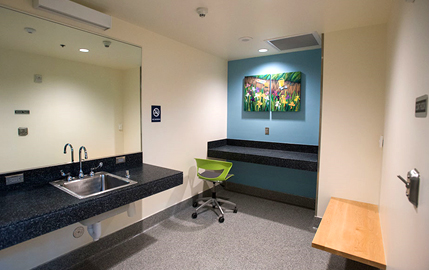
These are dedicated spaces that offer privacy for travelers and airport employees who need to express milk. The rooms are designed for use by people without their infants; however, those traveling with infants who are seeking a quiet and private place to nurse their babies may also use these rooms. Each room is equipped with ample counter space, electrical outlets, a sink & a chair. Rooms are ADA compliant and accessible.
Locations are as follows:
- Next to the restrooms behind Hello from Portland, pre-security for concourses B and C
- Next to the restrooms opposite Good Coffee on Concourse B
- Next to the restrooms beside gate D4 on Concourse D
- Next to the restrooms opposite gate E8 on Concourse E
Traveling With Your Own Wheelchair or Other Mobility Device
If you are a passenger with a disability and you will be traveling with your mobility device, here are a few suggestions to make your airport experience trouble-free and more enjoyable.
When making your airline reservations, advise your airline of the following information:
- Type of mobility device
- Please note that Segway mobility devices are not authorized to be stored on most carriers.
- Weight and size of mobility device
- Whether or not your mobility device will require assembly/disassembly
- Whether or not you are non-ambulatory, and will need an onboard wheelchair to reach your seat when boarding or deplaning the aircraft
- Whether or not you can ascend and descend stairs without assistance
- Whether or not you will be checking your mobility device at the ticket counter, or at the departure gate
When checking in for your flight on the day of departure, confirm all of the above information with an airline agent.
Allow Extra Time when traveling with a battery-powered/electric wheelchair, cart, or scooter:
- Although not required, it is recommended that you check in at your airline ticket counter at least 2 hours in advance; and,
- Arrive at your departure gate at least one hour prior to your scheduled departure.
Attach instructions to your wheelchair if assembly/disassembly is needed
- Although not required, it’s very helpful to airline staff if you attach a copy of assembly/disassembly instructions to your wheelchair (or other mobility device); and, if needed, bring specialized tools with you when traveling. (If you have questions regarding permitted carry-on tools, please contact the Transportation Security Administration at 1-866-289-9673.)
Identify battery type and know how to access it, if your mobility device is battery-powered
- Please let the airline staff know your wheelchair’s (or other mobility device’s) specific battery type, and identify the battery as either spillable or non-spillable so that airline staff can adhere to federal “dangerous goods” handling procedures.
- Before arriving at the airport, it is best if you can educate yourself on how to gain access to the battery compartment and bring a specialized tool, if needed.
- Some mobility devices have batteries that can only be accessed by a technician. If this is the case, you may not be able to fly with your mobility device. Check with your air carrier to be sure.
Folding wheelchairs
If space is available, many airlines will allow folding wheelchairs to be stowed in the cabin on a first-ask, first-serve basis. If cabin storage is not available, airlines will typically allow you to check your wheelchair as baggage at either the ticket counter or the departure gate. Your airline will provide a wheelchair and wheelchair aid to assist you to your gate, if needed.
Connecting City
Advise your airline in advance if you wish to use your mobility device in your connecting city. They’ll let you know if you will have sufficient time in your connecting city. If not, the airline can provide you with their wheelchair service.
Aisle Width of Aircraft
The width of aisle space varies from aircraft to aircraft. Some aisle width spaces can be fairly narrow and difficult to navigate with an airline’s onboard wheelchair. Ask your airline about the aisle width before confirming reservations, if you are concerned about the wheelchair transfer process from the gate onto the aircraft.
Policies vary from airline to airline regarding mobility devices in general. To learn more about your airline’s procedures and requirements for mobility devices, please visit your airline’s website or call their reservation desk.
Wheelchair Accessibility at PDX
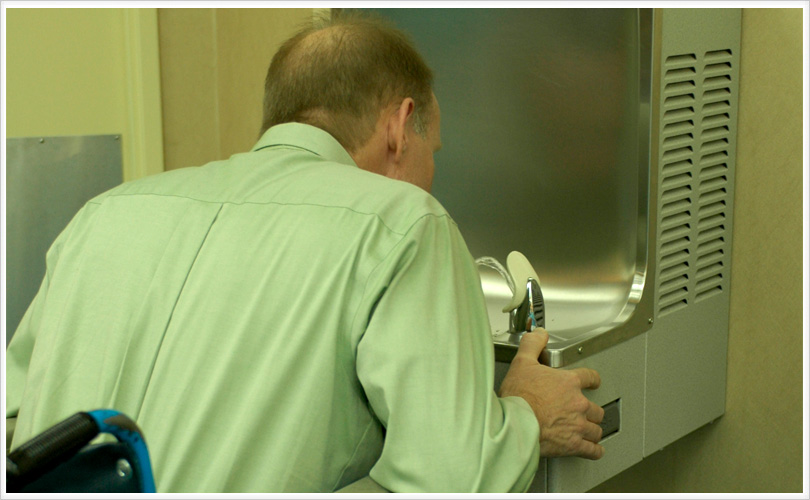
Drinking fountains throughout the airport offer convenient wheelchair access.
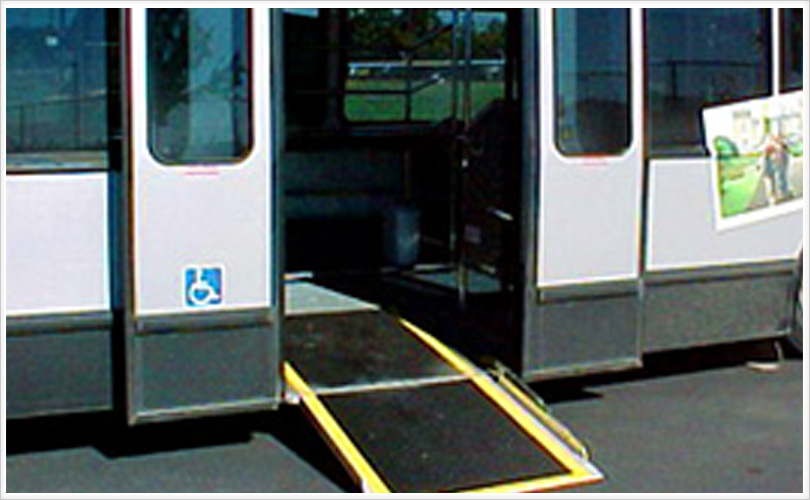
Airport parking lot shuttle buses are equipped with ramps and accessible.
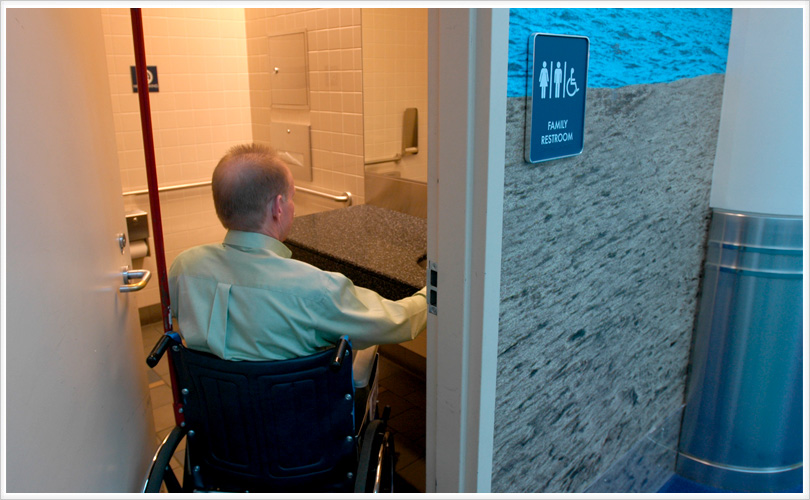
Spacious family restrooms are available on Concourse B (lower level), Concourse E (between gates E8 and E9), Concourse C (near west-end of bypass-tunnel), Concourse D (near gate D5; adjacent to the pet relief area). Pre-security, there are two family restrooms just past the ticket hall, one behind Paper Epiphanies and one behind Hello from Portland.
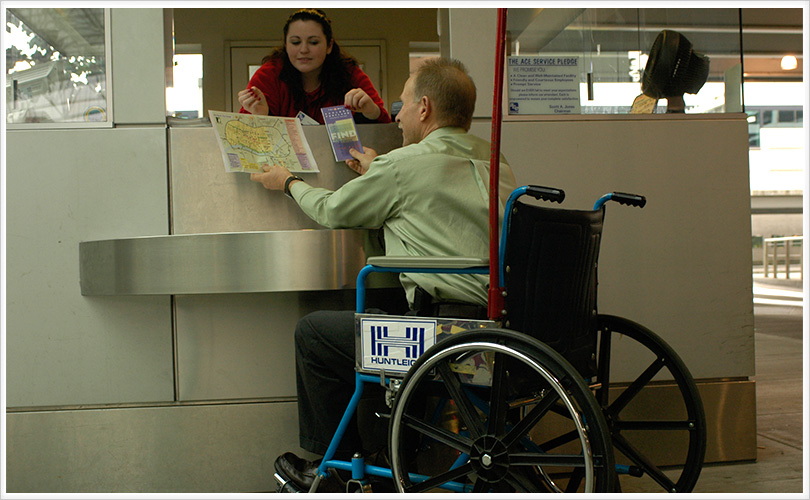
The ground transportation information booth on the arrivals level roadway provides an alternate counter for easy wheelchair access.
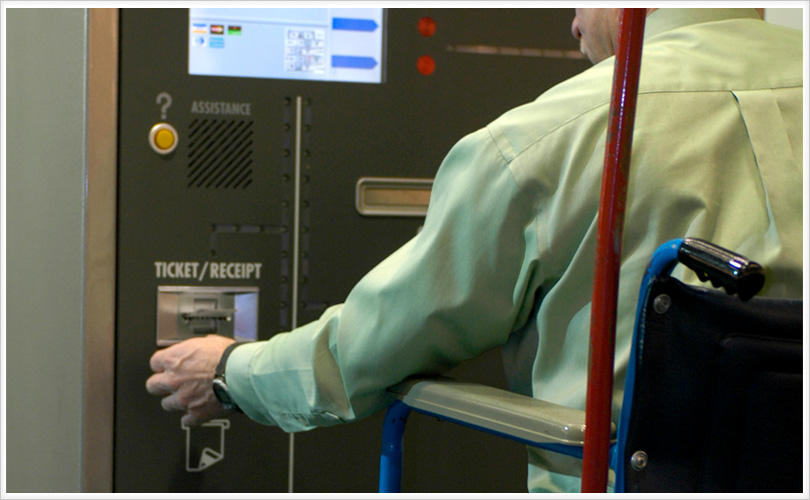
All Quick Pay parking payment machines in the airport's parking garage are easily accessible to customers in wheelchairs.
Our family restrooms are located near gates B6 (across from Good Coffee), C5 (across from the Pet Relief area), D4 and E8 (next to Jamba Juice). Pre-security, there are two family restrooms just past the ticket hall, one behind Paper Epiphanies and one behind Hello from Portland.
View and interactive map of family restrooms and all-user restrooms.
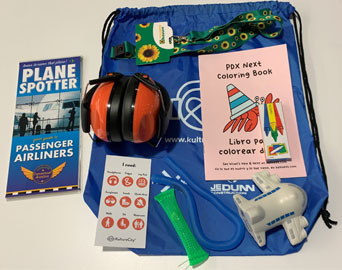
Sensory bars are a complimentary resource available to all passengers with sensory needs. These are available the Travel Oregon Welcome Center in baggage claim as well as the TSA supervisor desks at both the BC and DE security checkpoints. They include a set of hearing protection earmuffs, fidget tools, coloring book, crayons, Sunflower Lanyard, Plane Spotter Guide and Emotional Thermometer.
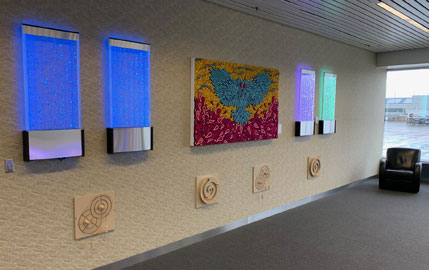
A sensory room is a special room designed to develop a person's sense, usually through special lighting, music, and objects. It can be used as a therapy for children with limited communication skills. Autism, or autism spectrum disorder (ASD), refers to a broad range of conditions characterized by challenges with social skills, repetitive behaviors, speech and nonverbal communication. According to the Centers for Disease Control, autism affects an estimated 1 in 59 children in the United States today. According to the Autism Society of Oregon, “Autism is the fastest growing developmental disability in Oregon – and the world. If you haven’t already, you will meet someone with autism.” At PDX, we partnered with a nonprofit named Kulture City as well as the Autism Society of Oregon and nearly a dozen other partners to develop the space at PDX. Our sensory room is located on Concourse D near gate D10. It's open and available to passengers 4 am - 12:30 am daily.
Service animal and pet relief areas are located both pre- and post-security. Pre-security, find the area outside baggage claim at the south end of the terminal (lower level). The post-security pet relief areas are located just past security for the B and C concourses near Stumptown Coffee, on Concourse C adjacent to the Alaska Lounge, and on Concourse D across from gate D5.
TSA Cares provides information on security procedures aimed to help passengers with disabilities, medical conditions and individuals needing additional assistance to better prepare for the security screening process.
TSA has modified procedures to ensure that your screening experience is smooth and seamless.
Visit TSA Cares for more information on support available.
Visual paging is available on all concourses, Baggage Claim and online.
Airlines coordinate wheelchair services from the roadway, ticket counters, valet and parking garages through security to departure gates, and from arrival gates to the baggage claim. Through an agreement with the wheelchair providers that service airlines, Rental car agencies at PDX provide service to/from the rental car center. Wheelchair service is provided at no charge, but gratuities are greatly appreciated. Please contact your airline directly to make a reservation prior to your arrival at the airport.
Wheelchair Service to/from Valet, Parking Garage or Rental Car Center
- Reserve a Wheelchair Prior to Travel
Contact your airline in advance and advise them that you will need assistance upon arrival. Tell them where and what time to meet you in the garage, rental car center or at the valet parking station) and the number of bags you will be carrying. - Park and Advise Wheelchair Dispatch of Your Location
If parking in the garage, park in the ADA designated spaces near the elevators (or in a non-disabled parking space, if you wish to take your disabled parking permit with you when traveling). Once parked, call wheelchair dispatch at 503.460.4300 and advise them where to meet you. White courtesy phones are located in the elevator cores and airport operators are available from 6 a.m. to 11:30 p.m.
*If using valet parking, please ask the attendant to request the wheelchair for you.
*Parking charges apply for the garage and valet parking.
Wheelchair Service for Sight-impaired Travelers
For wheelchair service or blind assists please contact your airline in advance if you are traveling; otherwise, use any of the white courtesy phones located throughout the terminal to contact an airport operator for assistance from 6 a.m. to 9:00 p.m. Your wheelchair (or blind assist) aid will assist you with your luggage. There is no charge for wheelchair assistance, but gratuities are appreciated.
Please allow up to 30 minutes for your wheelchair to arrive during peak travel times from 5:00 am to 7:30 am and from 10:00 am to 2:00 pm.
If you cannot walk short distances, you can park in the garage and wait for wheelchair assistance - applicable parking fees apply. Visit our parking page for disabled parking discount information.
If you can walk short distances, disabled loading and unloading spaces are available at the north and south ends of the upper and lower roadways in front of the terminal. Only active loading or unloading in these areas is allowed, and a driver is required to remain with the vehicle at all times. Unoccupied vehicles may be cited and/or towed. If you need to wait for wheelchair assistance, please do so in the parking garage or valet parking area.
Wheelchair Taxis
Taxi and other transportation network companies (“TNC”) such as Uber and Lyft are available to take you to and from the airport using wheelchair accessible vehicles.
For more information please see the ground transportation page.
